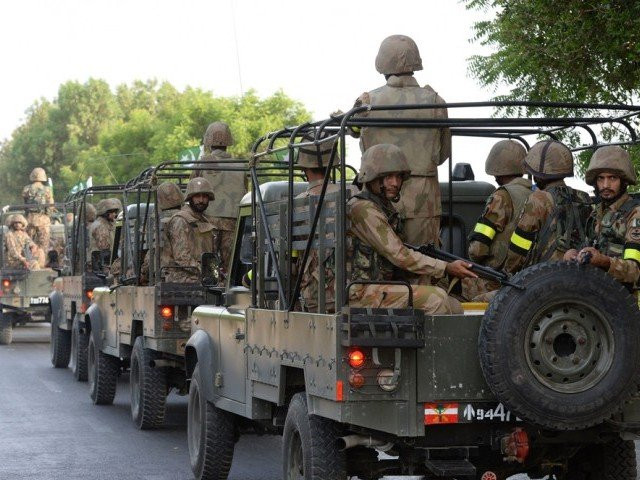Six weeks on: Most panels fail to execute NAP
Special committees overseeing implementation miss the targets

Special committees overseeing implementation miss the targets. PHOTO: AFP
Since Prime Minister Nawaz Sharif formed the panels on December 27 in the aftermath of the massacre at the Army Public School in Peshawar, there has been zero progress on many facets of the action plan, said a senior official tasked with monitoring progress on the execution of the plan.

In particular, authorities have been unable to push ahead with proposed madrassa reforms, added the official who spoke on condition that he would not be named in the report. The ministries of interior and religious affairs have been unable to convince stakeholders to endorse a proposed policy which binds madrassas to reveal their source of funding and have their accounts audited annually, he revealed.
“There is zero progress in terms of madrassa reforms,” admitted Punjab Home Minister Shuja Khanzada when contacted by The Express Tribune. “It appears we will have to face strong resistance from clerics, certain politicians and, of course, workers of the banned outfits in the province,” he said.
Madrassa reforms, however, are just one aspect of the National Action Plan progress on which seems to have stalled.
According to the official, the committee tasked with working out how to dismantle armed militias has also made no significant headway. Interior Minister Chaudhry Nisar Ali Khan, who heads this committee, has been unable to hold meetings over the issue with the directors general of the Inter-Services Intelligence (ISI), Intelligence Bureau (IB) and military operations due a ‘tight schedule’, he revealed.
“The committees tasked with countering hate speech and preparing recommendations to tackle sectarianism have made zero progress as well,” the official said. “Similarly, the panel tasked with preventing the reemergence of proscribed organisations has not been able to finalise fresh recommendations on the matter.”
The committee on countering religious persecution, which had to submit a report on suggested measures within three days, has also been unable to do so, the official told The Express Tribune.
Efforts to ensure all provinces have deployed counter-terrorism forces by May 31 this year have been unsuccessful so far, the official said. Despite two reminders, the ministers of finance and defence still have not responded to the interior minister’s requests.
The committee tasked with dismantling terrorist communication networks and social media presence has also met a similar fate, he revealed.
“There has been no progress on choking terror financing as well. The finance ministry has yet to send its recommendations on the matter to the interior minister, who could not even meet the Khyber-Pakhtunkhwa (K-P) governor, the Nadra (National Database and Registration Authority) chairman, and the minister for states and frontier regions to chalk out policy guidelines pertaining to Afghan refugees,” he said.
“For his part, K-P Governor Sardar Mehtab Khan could not finalise his recommendations for Fata (Federally Administered Tribal Areas) reforms and repatriation of temporarily displaced persons (TDPs),” he added.
The committee assigned to prepare recommendations on justice system reforms has also finalised no proposed amendments so far, the official revealed. “Although Punjab and K-P have arrested more than 10,000 terror suspects between them, they have yet to go after the most dangerous militants.”
“We still have to finalise a list of individuals who are either abetting or financing terrorists based in North Waziristan, other parts of the country and Afghanistan,” the Punjab home minister admitted.
Interior Minister Nisar, who is heading 11 of the 15 committee overseeing different aspects of the National Action Plan, has also expressed serious concern over the lethargic attitude of Sindh and Balochistan governments, the senior official said. “Both provinces have yet to finalise proposed legislations and compile detailed progress reports.”
When contacted, Balochistan Home Secretary Akbar Khan Durrani said that while the province is heading towards swift execution of the action plan, its efforts have been hampered by a lack of resources. Still, he said, authorities in the province would finalised proposed legislations and recommendations on other related issues by next week.
Talking to The Express Tribune, Tasneem Noorani, a member of the experts’ panel which gave recommendations for the National Action Plan, said the results achieved so far were ‘not encouraging’.
“Preventive actions are hardly based on figures. I will call it gimmickry,” he said referring to the arrest of thousands of suspects. “We have not seen any action against the ‘big guns’ facilitating militants. The nation needs action on the ground rather than just the release of new figures.”
Meanwhile, the senior official monitoring the plan’s execution said the security establishment was not satisfied with the efforts. “Since the APS tragedy took place, all the government has done is pass legislation to set up military courts,” he added. “Setting up military courts is not enough. Seven weeks have passed, but the law-enforcement agencies could not even arrest 200 ‘jet-black’ terrorists.”
Opposition parties are also unhappy with the government’s counterterrorism efforts. “Either the government is not serious or it’s totally clueless, confused and directionless or perhaps both,” PPP leader Senator Farhatullah Babar told The Express Tribune.
“We hear about apex committees but there has been no formal notification about their composition, terms of reference and chain of command,” he added. “No wonder if nine out of 15 committees [tasked to execute the National Action Plan] have zero performance.”
Published in The Express Tribune, February 9th, 2015.



















COMMENTS
Comments are moderated and generally will be posted if they are on-topic and not abusive.
For more information, please see our Comments FAQ